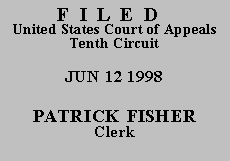

| UNITED STATES OF AMERICA,
v.
CHRISTOPHER M. FORD,
Defendant - Appellant |
No. 97-4210 (D.C. No. 89-CR-78) |
upon a misreading of 18 U.S.C. § 3564(b); therefore, we affirm the district court's order.(1)
Mr. Ford has been convicted of various offenses in both state and federal courts, but an understanding of the chronology of those convictions is required for comprehension of the issue before us. The saga began with his conviction in state court and subsequent incarceration in the Utah State Penitentiary in 1989. On December 20, 1990, he was convicted in Federal Court and placed on probation for sixty months "to commence June 11, 1991 or, in the alternative, when he is released on parole from the Utah State Prison." On May 12, 1991, Mr. Ford was released from state prison, and his federal probation commenced. (Without a tolling of the period of probation, he would have served his federal sentence on May 12, 1997.)
After serving twelve months on probation, Mr. Ford's state parole was revoked on June 12, 1993. He remained in state prison for four months and was re-released on October 15, 1993. Mr. Ford remained trouble free for some thirty months thereafter, but, on April 4, 1996, he was arrested on new state charges of forgery and returned to physical custody of the state. On that same date, federal probation officer McBride filed a petition for probation action in the U.S. District Court for the District of Utah.
Officer McBride's petition asserted Mr. Ford's arrest on three state counts and referred to the general conditions of probation (which included avoiding commission of any crime) and prayed for the issuance of a probation violator's warrant with the placement of a detainer with the county jail. The warrant was issued the same day.
Mr. Ford apparently remained in jail until convicted on the state charges on August 8, 1996. He was sent to the Utah State Prison for fourteen months and then released and placed on supervised state probation. On the day of his release, October 9, 1997, the federal court docket indicates Mr. Ford appeared in court "in custody" and "charges" were read and explained to him, and a temporary detention order was issued. He requested and received the appointment of counsel.
Following Mr. Ford's waiver of a probable cause hearing, he filed a motion to dismiss predicated upon the contention his federal probation had expired and the court no longer had jurisdiction over him. After a hearing, that motion was denied and Mr. Ford was ultimately sentenced to a reinstated federal probation of nineteen months. Defendant filed a notice of appeal, and the matter is now before us for review.
On appeal, Mr. Ford presents the same argument he advanced in the district court. This argument is rooted in 18 U.S.C. § 3564(b) which states in part:
A term of probation does not run while the defendant is imprisoned in connection with a conviction for a Federal, State, or local crime unless the imprisonment is for a period of less than thirty consecutive days.
Mr. Ford argues, properly read, this statute indicates a federal period of probation continues despite the probationer's incarceration on state charges, unless those charges result in conviction for "a new crime." He does not support that argument with other than his own interpretation of the statute.
We believe that argument flies in the face of the clear statutory language. The statute provides no credit for a federal probationer in state custody for longer than thirty days "in connection with a conviction for a . . . state . . . crime." Nothing within the statute suggests that the state crime be a "new" offense as defendant contends, and short of adding language that does not exist, there is no way to reach the conclusion defendant seeks.
This conclusion forecloses Mr. Ford's basic argument that his federal probation expired on May 12, 1995, before his state forgery conviction on August 8, 1996. Because defendant's original state probation was revoked on June 12, 1993, and he was imprisoned until October 15, 1993, his federal probation was tolled for four months by operation of § 3564(b). Thus, the period of his original federal probation was extended to September 12, 1996, some two months after he was sentenced on the forgery charges. Moreover, because the warrant was issued in this case before the expiration of Mr. Ford's federal probation, the court maintained jurisdiction to modify his probation even
though the sentence was entered after September 12, 1996. See 18 U.S.C. § 3565(c).
AFFIRMED.
ENTERED FOR THE COURT
John C. Porfilio
Circuit Judge
*. This order and judgment is not binding precedent, except under the doctrines of law of the case, res judicata, and collateral estoppel. This court generally disfavors the citation of orders and judgments; nevertheless, an order and judgment may be cited under the terms and conditions of 10th Cir. R. 36.3.
1.Neither party has requested oral argument; therefore, this case is submitted on the briefs.